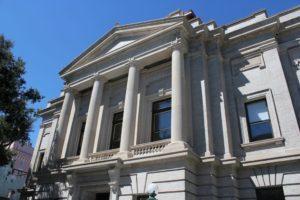News
The Gibbes Museum of Art Offers Free Admission to Military Families
 The Gibbes Museum of Art this week announced the launch of Blue Star Museums, a collaboration among the National Endowment for the Arts, Blue Star Families, the Department of Defense, and more than 2,000 museums across America to offer free admission to the nation’s active duty military personnel and their families from Memorial Day through Labor Day.
The Gibbes Museum of Art this week announced the launch of Blue Star Museums, a collaboration among the National Endowment for the Arts, Blue Star Families, the Department of Defense, and more than 2,000 museums across America to offer free admission to the nation’s active duty military personnel and their families from Memorial Day through Labor Day.
“The Gibbes Museum of Art has been a proud member of the Blue Star Museum program for years and is happy to welcome military families back to the Gibbes again this year,” Angela Mack, Executive Director of the Gibbes Museum of Art, said. “The museum strives to enhance lives through art by engaging people of every background and experience with art and artists of enduring quality, by collecting and preserving art that touches Charleston, and by providing opportunities to learn, to discover, to enjoy and to be inspired by the creative process.”
The Gibbes Museum of Art features 10,000 objects in the permanent collection and six–eight special exhibitions every year. Visitors to the museum through Labor Day can view these special exhibitions:
- New Acquisitions Featuring Works by African American Artists
- Featuring a selection of works by African American artists acquired by the Gibbes for its permanent collection over the last ten years, this exhibition reflects on the Gibbes collecting efforts since the opening of Prop Master: An Installation by Juan Logan and Susan Harbage Page in 2009. The artists’ provocative installation was designed to highlight the role the institution of museums plays in shaping social norms and reinforcing power structures within the community based on what it chooses to collect and exhibit and, perhaps more importantly, what works and narratives are excluded. Since the close of the Prop Master exhibition nearly ten years ago, the Gibbes has added 28 new works by African American artists, including David Driskell, Sam Doyle, Leo Twiggs, Kara Walker and Mary Jackson.
- Black Refractions: Highlights from The Studio Museum in Harlem
- The Gibbes Museum of Art is the only Southern venue selected to host Black Refractions, the first traveling exhibition highlighting the full breadth of The Studio Museum in Harlem’s unparalleled permanent collection. Founded in 1968, The Studio Museum in Harlem is internationally known for its catalytic role in promoting the works of artists of African descent. The exhibition, including works by artists such as Jacob Lawrence, Romare Bearden, David Hammons, Fred Wilson, Kerry James Marshall, Titus Kaphar, Kehinde Wiley and Lorna Simpson, will expand understanding of modern and contemporary art by artists of African descent. Black Refractions is a once-in-a-lifetime opportunity to share these incredible works of art with the Charleston community. The artists in this exhibition are powerful voices in contemporary art that encourage viewers to consider the world around them in new and thoughtful ways. The exhibition will also travel to prestigious museums in California, Washington, Michigan and Utah.
- Luminous Landscapes: The Golden Age of British Watercolors
- Drawn from the collection of British watercolors bequeathed to the Gibbes Museum by John Wigger in 2004, this exhibition showcases a selection of works on paper created during the “Golden Age of Watercolor” in the 18th and 19th centuries in England. These romantic landscapes emphasized brilliant colors, loose brushstrokes and attention to light and atmospheric effects. Many of the artists featured in Luminous Landscapes such as John Varley (British, 1778–1842), Paul Sandby (British, 1725–1809) and David Cox Sr. (British, 1783–1859) were instrumental in elevating the status of watercolor painting over the century as it was brought to its full maturity in England and heavily influenced the work of burgeoning Lowcountry artists, Thomas Coram and Charles Fraser, who were among America’s first landscape painters.
A list of participating museums is available at arts.gov/bluestarmuseums. For more information on the Gibbes Museum of Art, visit www.gibbesmuseum.org.
























